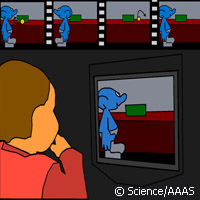Babies can understand people's perspective!
A new EU-funded study suggests that tiny tots, even babies, have the ability to understand and consider others' perspectives. But what is even more intriguing is that it seems to be an automatic response for them, one that is made with virtually no effort. And all this kicks in way before the tot turns a year old. The results are presented in the journal Science. The research was funded in part by the CALACEI ('Universal and specific properties of a uniquely human competence. Tools to study language acquisition in early infancy: Brain and behavioural studies') and DISCOS ('Disorders and coherence of the embodied self') projects, both funded under the EU's Sixth Framework Programme (FP6). CALACEI received EUR 1.5 million under the 'New and emerging science and technology' (NEST) Activity and DISCOS is supported by a Marie Curie Research Training Network grant worth almost EUR 3 million. Researchers call a person's ability to infer others' intentions and beliefs the 'theory of mind'. This ability plays a crucial role in effective social interactions and may have been a central condition in building cooperative human societies, experts say. Before this study, most researchers believed that children younger than ages three or four did not possess the theory of mind ability. But the results indicate that there is a strong possibility that they actually do. Marie Curie Research Fellow Dr Ágnes Melinda Kovács from the Institute for Psychology at the Hungarian Academy of Sciences and her colleagues investigated this phenomenon by testing adults and seven-month-old infants with a series of animated videos. In these videos, a ball first rolls behind a small wall, and then either stays put, rolls away and returns, or rolls out of view. The reaction times of both the adults and infants were faster when the animated character's 'belief' about the ball's location matched the ball's actual whereabouts, according to the researchers. This was also the case when the animated character had left the screen once the video ended. The team speculates that even if the people are no longer present, regardless of whether they are young or old, people will still remember their beliefs as alternative representations of the world. 'Developing tasks that can be used with very young infants will significantly contribute to current efforts to achieve early detection and diagnosis of autism, and will pave the ways towards early intervention techniques,' Live-Science quoted Dr Kovács as saying. 'Human social interactions crucially depend on the ability to represent other agents' beliefs even when these contradict our own beliefs, leading to the potentially complex problem of simultaneously holding two conflicting representations in mind,' the authors of the study write. 'Here, we show that adults and seven-month-olds automatically encode others' beliefs, and that, surprisingly, others' beliefs have similar effects as the participants' own beliefs.' The results of this study will further boost awareness of how important a role the theory of mind ability is, particularly for one's capacity to infer others' mental states. Researchers from Italy and the US contributed to this study.For more information, please visit: Science: http://www.sciencemag.org/(opens in new window) CALACEI project factsheet on CORDIS - click: here DISCOS project factsheet on CORDIS - click: here
Countries
Hungary, Italy, United States



